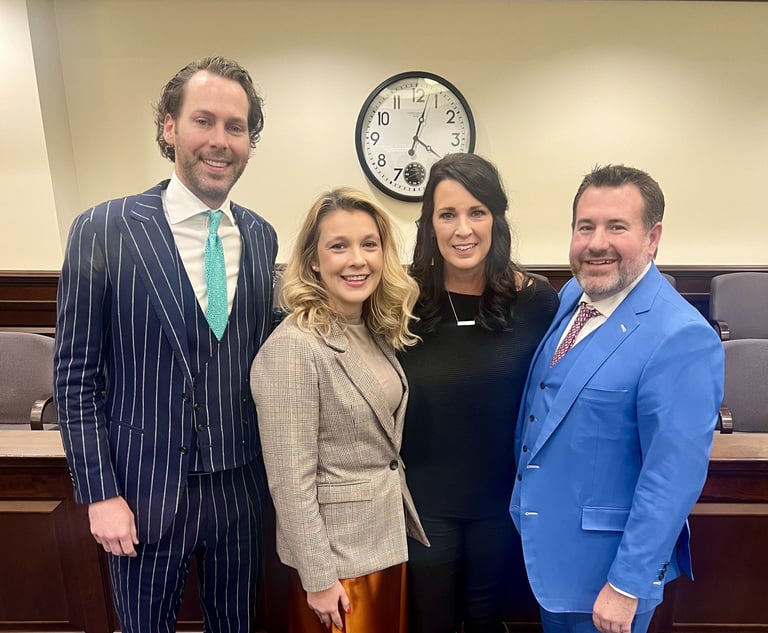Pa. Supreme Court Opinion Rocks First-Party IME Requirements
Insurance carriers can no longer condition payment of medical benefits on completion of an independent medical examination (IME), unless first obtaining a court order requiring the examination, according to a recent decision from the Pennsylvania Supreme Court.
January 02, 2020 at 12:06 PM
8 minute read
 Patrick Furlong of Marshall Dennehey Warner Coleman & Goggin
Patrick Furlong of Marshall Dennehey Warner Coleman & Goggin
Insurance carriers can no longer condition payment of medical benefits on completion of an independent medical examination (IME), unless first obtaining a court order requiring the examination, according to a recent decision from the Pennsylvania Supreme Court. In Sayles v. Allstate Insurance, 2019 Pa. LEXIS 6457 (Pa. Nov. 20, 2019), the court found that policy language requiring an insured to submit to an IME as a prerequisite to receiving first-party medical benefits was void, since it was in direct contradiction to the express language contained in the Pennsylvania Motor Vehicle Financial Responsibility Law (MVFRL), 75 Pa. C.S. Section 1796(a).
Policy and Statutory Language at Issue
Two cases, both dealing with benefit termination based on refusal to submit to an IME, were initially filed in state court. Each matter was removed to the U.S. District Court for the Middle District of Pennsylvania, and then both were consolidated on appeal to the U.S. Court of Appeals for the Third Circuit. The Third Circuit certified the question to the Pennsylvania Supreme Court, since there was no controlling state appellate holding on the subject matter. The main issue before the Pennsylvania Supreme Court was the interplay of common policy language requiring an insured to submit to regular IMEs at the carrier's discretion, read in the context of the MVFRL language as requiring a court order for an IME based on "good cause shown."
Specifically, the respective policies at issue required the insureds to "submit to mental and physical examinations by physicians selected by insurance carrier when and as often as the insurance carrier may reasonably require." The plaintiffs were injured in auto accidents, and their respective carriers advised they were required to attend IMEs as part of the claims adjustment process for first-party medical benefits, based on the above-cited language contained in the policies. When the plaintiffs did not attend the IMEs, their benefits were discontinued based on the argument that the plaintiffs did not meet their contractual obligations as stated in the subject insurance policies. The plaintiffs challenged this position, arguing that such a position was in direct contradiction of Section 1796(a) of the MVFRL, which states: "Whenever the mental or physical condition of a person is material to any claim for medical, income loss or catastrophic loss benefits, a court of competent jurisdiction … may order the person to submit to a mental or physical examination by a physician. The order may only be made upon motion for good cause shown. The order shall give the person to be examined adequate notice of the time and date of the examination and shall state the manner, conditions and scope of the examination and the physician by whom it is to be performed. If a person fails to comply with an order to be examined, the court or the administrator may order that the person be denied benefits until compliance."
Arguments of the Parties
The plaintiffs argued that the statutory requirement meant that a court order is required any time an IME is requested in the context of a claim for first-party medical benefits. They argued the language of the statute is clear and unambiguous, requiring a court order, upon good cause shown, any time the "physical condition of a person" is at issue in a claim for benefits. There was no exclusionary language included, or other exemptions noted for insurance carriers. They further argued that the policy requirements imposed an unfair intrusion on the plaintiffs and that the involvement of an impartial court would protect against potentially self-serving requirements of the biased insurance carrier.
The carriers argued that the language of the statute made the court order requirement permissive, rather than mandatory, and would apply if an insurance policy did not contain the express language requiring submission to an IME. Section 1796(a) states that a court "may" order a person, not "shall" order a person to submit to an IME. They further argued that the language does not specify that it applies to an "insurer." There are a number of other provisions within the MVFRL that state "the insurer shall" complete or refrain from various actions. Thus, the exclusion of such language here, when included elsewhere, implicitly demonstrates the legislature's intention to exempt insurers from this requirement, making the subject policy language binding.
It should be noted that a person's voluntary submission to an IME is an acknowledged exception to the court order requirement. The Supreme Court's holding applies only when a plaintiff does not consent to the IME, or to the conditions of the IME as stated by the carrier.
Court Analysis
The court began with a statutory construction approach, stating that the plain language of the statute applied any time a person's condition "is material to any claim" and not only those claims that are not otherwise controlled by other insurance policy language. The court found that any other reading of the statute would be counter to the clear intention of the legislature. The court then transitioned into a public policy oriented argument, stating that including the courts in the IME process would prevent the individual insured against "unwarranted intrusions on his or her privacy by being subject to repeated and unnecessary medical examinations in order to obtain first-party benefits." The court further stated that allowing an exception from the statutory language would mean that the protections intended under Section 1796(a) would only apply if an insurance carrier chose to leave out the IME requirement language from their policy. If that language were left out, then the carrier would need a court order to obtain an IME anyway, which would entirely nullify the purpose of Section 1796.
The court also held that while a stated purpose of the MVFRL is to reduce the costs of providing insurance in Pennsylvania, the statutory framework is also intended to ensure that Pennsylvania residents have access to, and could quickly obtain, payment for injuries that are sustained on Pennsylvania roadways, with minimal impediment.
The court ultimately concluded that there was no way to read the policy language while still giving effect to the statutory requirements. Since contractual language cannot alter statutory requirement, the contractual language was found to be against public policy, and was deemed void and unenforceable.
Impact of Decision
The decision will impact litigation in a few ways. First, in order to obtain an IME in the context of a claim for first-party medical benefits, an insurance carrier must first get a court order, having shown good cause exists. Further, if such language requiring an IME at the discretion of the carrier is contained in the insurance policy, such language is deemed void and unenforceable.
It should be noted that an insurance carrier can still request an IME. If the insured submits to the request voluntarily, the above decision would not be implicated. However, if the insured refuses the IME, such a refusal cannot serve as a basis to discontinue medical benefits. Rather, the carrier must petition the court for an order to compel the IME.
It should also be noted that this decision does not impact the peer review process, which is separate from the IME policy requirement language, and is controlled by a separate provision of the MVFRL, Section 1797.
While it was not the focus of the court's instant opinion, it is doubtful that this holding will have any effect on the IME process in the context of UM/UIM claims. The two underlying cases that prompted the court's opinion dealt expressly with claims for first-party PIP benefits, so the holding should only apply in that context. Moreover, Section 1796(a) uses the term "medical benefits" rather than "first-party" benefits, and even while case law holds UM/UIM claims to be quasi-first-party issues, such claims are premised on negligence and liability-focused inquiries, whereas the statutory language here is expressly limited to the claims investigation related to medical benefits. Finally, an insured's voluntary submission to an IME is a well-accepted exception to the statutory language and voluntary IMEs are typically agreed upon in the UM/UIM claim context.
Patrick J. Furlong is an associate in the Philadelphia office of Marshall Dennehey Warner Coleman & Goggin. A member of the firm's casualty department, he focuses a portion of his practice on first-party medical claims under automotive insurance policies. Contact him at [email protected].
This content has been archived. It is available through our partners, LexisNexis® and Bloomberg Law.
To view this content, please continue to their sites.
Not a Lexis Subscriber?
Subscribe Now
Not a Bloomberg Law Subscriber?
Subscribe Now
NOT FOR REPRINT
© 2025 ALM Global, LLC, All Rights Reserved. Request academic re-use from www.copyright.com. All other uses, submit a request to [email protected]. For more information visit Asset & Logo Licensing.
You Might Like
View All
Harrisburg Jury Hands Up $1.5M Verdict to Teen Struck by Underinsured Driver
3 minute read
Philadelphia Eagles 0-2 in Attempts to Recover Insurance on COVID-Related Losses
4 minute read
High Verdicts and Venue Rule Land Pa. Courts on Top of 'Judicial Hellhole' List
5 minute read
Law Firms Mentioned
Trending Stories
- 1States Accuse Trump of Thwarting Court's Funding Restoration Order
- 2Microsoft Becomes Latest Tech Company to Face Claims of Stealing Marketing Commissions From Influencers
- 3Coral Gables Attorney Busted for Stalking Lawyer
- 4Trump's DOJ Delays Releasing Jan. 6 FBI Agents List Under Consent Order
- 5Securities Report Says That 2024 Settlements Passed a Total of $5.2B
Who Got The Work
J. Brugh Lower of Gibbons has entered an appearance for industrial equipment supplier Devco Corporation in a pending trademark infringement lawsuit. The suit, accusing the defendant of selling knock-off Graco products, was filed Dec. 18 in New Jersey District Court by Rivkin Radler on behalf of Graco Inc. and Graco Minnesota. The case, assigned to U.S. District Judge Zahid N. Quraishi, is 3:24-cv-11294, Graco Inc. et al v. Devco Corporation.
Who Got The Work
Rebecca Maller-Stein and Kent A. Yalowitz of Arnold & Porter Kaye Scholer have entered their appearances for Hanaco Venture Capital and its executives, Lior Prosor and David Frankel, in a pending securities lawsuit. The action, filed on Dec. 24 in New York Southern District Court by Zell, Aron & Co. on behalf of Goldeneye Advisors, accuses the defendants of negligently and fraudulently managing the plaintiff's $1 million investment. The case, assigned to U.S. District Judge Vernon S. Broderick, is 1:24-cv-09918, Goldeneye Advisors, LLC v. Hanaco Venture Capital, Ltd. et al.
Who Got The Work
Attorneys from A&O Shearman has stepped in as defense counsel for Toronto-Dominion Bank and other defendants in a pending securities class action. The suit, filed Dec. 11 in New York Southern District Court by Bleichmar Fonti & Auld, accuses the defendants of concealing the bank's 'pervasive' deficiencies in regards to its compliance with the Bank Secrecy Act and the quality of its anti-money laundering controls. The case, assigned to U.S. District Judge Arun Subramanian, is 1:24-cv-09445, Gonzalez v. The Toronto-Dominion Bank et al.
Who Got The Work
Crown Castle International, a Pennsylvania company providing shared communications infrastructure, has turned to Luke D. Wolf of Gordon Rees Scully Mansukhani to fend off a pending breach-of-contract lawsuit. The court action, filed Nov. 25 in Michigan Eastern District Court by Hooper Hathaway PC on behalf of The Town Residences LLC, accuses Crown Castle of failing to transfer approximately $30,000 in utility payments from T-Mobile in breach of a roof-top lease and assignment agreement. The case, assigned to U.S. District Judge Susan K. Declercq, is 2:24-cv-13131, The Town Residences LLC v. T-Mobile US, Inc. et al.
Who Got The Work
Wilfred P. Coronato and Daniel M. Schwartz of McCarter & English have stepped in as defense counsel to Electrolux Home Products Inc. in a pending product liability lawsuit. The court action, filed Nov. 26 in New York Eastern District Court by Poulos Lopiccolo PC and Nagel Rice LLP on behalf of David Stern, alleges that the defendant's refrigerators’ drawers and shelving repeatedly break and fall apart within months after purchase. The case, assigned to U.S. District Judge Joan M. Azrack, is 2:24-cv-08204, Stern v. Electrolux Home Products, Inc.
Featured Firms
Law Offices of Gary Martin Hays & Associates, P.C.
(470) 294-1674
Law Offices of Mark E. Salomone
(857) 444-6468
Smith & Hassler
(713) 739-1250





